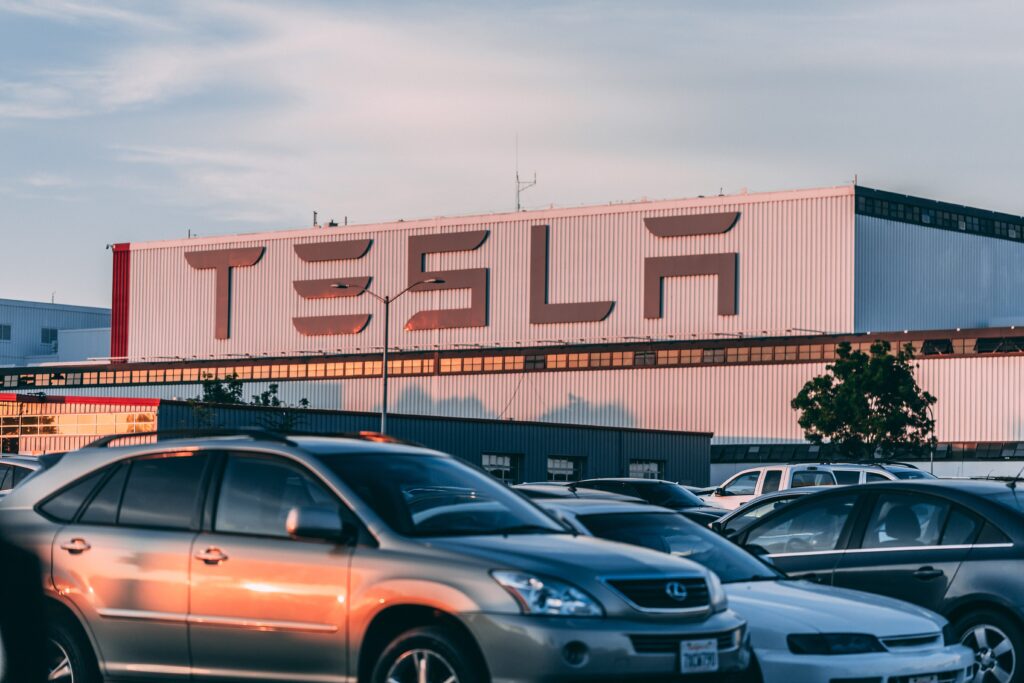Table of Contents
Electric Vehicles (EVs) have emerged as a promising innovation in the automotive sector, offering sustainable transportation solutions. With their electric motors powered by rechargeable battery packs, EVs emit zero toxic exhaust emissions, reduce noise pollution, and contribute to a greener environment. The global electric car market is projected to reach a value of $1.9 trillion by 2028, with a remarkable compound annual growth rate (CAGR) of 37.1% until 2028. As the market continues to grow, several manufacturers stand out as leaders in the EV industry, both in terms of market capitalization and units sold. Let’s take a closer look at the top 10 electric vehicle manufacturers shaping the future of transportation.
1. Tesla
Tesla, formerly known as Tesla Motors, is a trailblazer in the Electric Vehicle industry. With a market capitalization of approximately $828.85 billion in 2022, Tesla is the world’s largest automobile manufacturer. Tesla has gained a reputation for its commitment to creating electric vehicles and providing sustainable energy solutions. The company offers a range of electric vehicle models, including the popular Model S, Model X, Model Y, and Model 3. Tesla continues to innovate with upcoming models like the Cybertruck and Tesla Roadster, set to be available in 2023.

New Technologies & Innovations by Tesla
Lithium-Iron-Phosphate (LFP) Battery: In 2021, Tesla announced a switch to lithium-iron-phosphate (LFP) batteries for its standard-range electric vehicles. LFP batteries offer a more affordable and stable option, prioritizing safety. However, they provide slightly less range for the same weight compared to conventional cells.
Supercharger Network: Tesla’s extensive Supercharger network allows Tesla owners to conveniently charge their vehicles. In 2021, Tesla initiated a trial program in the Netherlands, granting access to non-Tesla electric vehicles at selected Supercharger stations. With over 25,000 superchargers worldwide, Tesla continues to expand its charging infrastructure.
J1772 Gen 2 Wall Connector: Tesla unveiled a home charger featuring a J1772 plug compatible with North American electric vehicles. The J1772 Gen 2 Wall Connector offers up to 9.6 kW (40 amp) power output for efficient home charging.
4680 Battery: Tesla revealed the 4680 battery, a cylindrical battery with a larger capacity than the previous 2170 battery. The 4680 battery is expected to provide approximately five times the energy capacity, contributing to improved performance and range.
14-50 Wall Connector: Tesla introduced the 14-50 Wall Connector, a non-hardwired home charging option for Tesla owners. Delivering 9.6 kW of electricity, it supports charging for Tesla’s Model S, Model X, and Model 3.
2. Toyota
Toyota, a renowned Japanese company, has been a significant player in the automotive industry since 1933. The company introduced its first mass-produced hybrid vehicle, the Prius, in 1997. Recently, Toyota announced its entry into the battery-electric vehicle market with the bZ4X. This all-wheel-drive electric vehicle offers a range of 252 miles per charge.

New Technologies & Innovations by Toyota
e-TNGA Platform: Toyota unveiled its e-TNGA platform, designed specifically for battery-electric vehicles. This platform provides flexibility in terms of vehicle dimensions, accommodating varying widths, lengths, wheelbases, and heights. Toyota is developing an SUV model based on the e-TNGA platform, signaling its commitment to electric powertrains.
Solid-State Battery Research: Toyota partnered with the US company Factorial Energy to advance solid-state battery technology. Factorial Energy’s ‘FEST’ technology aims to increase driving distance by 20-50% and improve the safety of electric vehicles compared to conventional lithium-ion batteries.
3. BYD
BYD, one of China’s largest EV companies, initially started as a battery manufacturer in 1995 and expanded into automobile manufacturing in 2003. The company offers a diverse range of zero-emission electric vehicles, including the Han, Qin Pro, Song Pro, Tang, and Yuan models.

New Technologies & Innovations by BYD
Iron Phosphate Battery Solutions: BYD’s Iron Phosphate Battery Solutions provide safe and reliable energy storage in various applications. Originally developed for utility-scale energy systems, these batteries offer long cycle life and stability, making them ideal for battery-operated electric buses.
Blade Battery: BYD introduced the Blade Battery in 2020, featuring an innovative stacking design for improved energy density. The Blade Battery significantly increases the capacity of battery packs compared to conventional lithium iron phosphate block cells.
4. General Motors
General Motors (GM), a long-standing automotive manufacturer, has transitioned to electric vehicle models in recent years. GM’s EV lineup is powered by its Ultium Platform, and the company aims for an all-electric future with zero emissions. Notable electric vehicle models from GM include the Chevrolet Bolt, with the highly anticipated Bolt EUV and the Chevrolet Silverado electric pickup truck on the horizon.

New Technologies & Innovations by General Motors
Ultium Battery: GM developed the Ultium battery, featuring a nickel-cobalt-manganese-aluminum composition. The Ultium cell significantly reduces the use of cobalt by approximately 70% while providing improved energy density. GM plans to launch 30 new EV models globally by 2025, utilizing the Ultium battery technology.
Various Electric Motors: GM introduced a range of electric motors in 2021 to power its upcoming electric vehicles. These motors include a 62 kW all-wheel-drive assist induction motor, a 255 kW rear- and front-drive permanent magnet motor, and a 180 kW front-drive permanent magnet motor.
Ultium Drive: GM’s Ultium Drive electric powertrain systems offer versatility for various vehicle types. With options for all-wheel drive, front-wheel drive, and rear-wheel drive, Ultium Drive enables efficient and dynamic performance across GM’s EV lineup.
5. Volkswagen Group
Volkswagen Group, a renowned automotive conglomerate, is committed to electrifying its vehicle lineup with a series of fully electric models. The company’s ID brand represents a new era of intelligent design, identity, and visionary technologies.

New Technologies & Innovations by Volkswagen Group
Unified Battery Cells: Volkswagen is working towards implementing a unified prismatic cell design for its batteries. By 2030, the company aims to have a standardized battery architecture powering the majority of its electric vehicles, enhancing efficiency and scalability.
Volkswagen Naturstrom Connect: Volkswagen introduced Naturstrom Connect, a smart home electricity tariff designed specifically for Volkswagen electric and plug-in hybrid vehicle owners. This tariff integrates with electric car charging, allowing users to manage their charging process through the Naturstrom Connect app.
Modular Electric Drive Matrix (MEB): Volkswagen’s future electric vehicles, part of the ID family, are based on the Modular Electric Drive Matrix (MEB) platform. The MEB platform offers flexibility in vehicle dimensions and accommodates different battery sizes, transforming the design and capabilities of electric vehicles.
6. SAIC Motors
SAIC Motors, a major automotive manufacturer in China, produces a wide range of vehicles, including electric models. One of its notable achievements is the Hong Guang MINI EV, which has become the best-selling electric vehicle in China due to its affordability.

Belarus – Dec 15, 2021: Automobile production line. Welding car body. Modern car assembly plant. Auto industry. Interior of a high-tech factory, modern production.
New Technologies & Innovations by SAIC Motors
Silicon-Doped Lithium Supplement Battery Cell Technology: SAIC Motor’s BEV brand, Zhiji Motor, collaborates with CATL to develop silicon-doped lithium supplement battery cell technology. This technology aims to enhance electric vehicle range, targeting up to 1,000 kilometers on a single charge.
Mini Battery Swap Station: SAIC, along with GM and Liuzhou Wuling Motors, launched a smart compact battery swap station for new energy vehicles. This battery swap station provides convenient and efficient battery replacement options for electric vehicle owners.
Solid-State Lithium-Ion Battery: SAIC is working on the development of solid-state lithium-ion batteries, focusing on exceptional safety and energy density. Commercial availability of solid-state batteries is expected by 2025.
7. BMW
BMW, a renowned luxury automaker, has been actively involved in the electric vehicle market. The company introduced its first all-electric car, the BMW E1, in 1991. While facing competition from newer EV manufacturers, BMW continues to innovate with electric vehicle models like the upcoming BMW i7 sedan.

New Technologies & Innovations by BMW
Hydrogen Fuel Cell Technology: BMW is exploring hydrogen fuel cell-powered vehicles. The company is working on the BMW i-Hydrogen NEXT, which utilizes hydrogen as a power source instead of conventional battery technology.
eDrive Technology: BMW’s eDrive technology is present in all BMW i-models and plug-in hybrids. These vehicles incorporate high-performance lithium-ion batteries and advanced cooling systems for optimal efficiency and serviceability.
8. Nissan
Nissan, a prominent automaker, introduced its all-electric vehicle, the Nissan Leaf, in 2010. One of the most well-known and reasonably priced electric cars on the market is still the Leaf. Nissan aims to make 40% of its U.S. sales electric by 2030.

New Technologies & Innovations by Nissan
e-4ORCE AWD Technology: Nissan’s e-4ORCE technology revolutionizes all-wheel drive performance in electric vehicles. Utilizing two electric motors, e-4ORCE responds with precision to driver input, delivering enhanced control and stability.
e-POWER System: Nissan has achieved a milestone in engine efficiency with its e-POWER system, reaching 50% thermal efficiency. The e-POWER system combines an onboard gasoline engine with a battery powertrain, providing improved fuel economy and reduced emissions.
ProPILOT 2.0: Nissan’s ProPILOT 2.0 is an advanced driver-assistance system that enables semi-autonomous driving. It uses multiple sensors to detect lane markings, signs, and approaching vehicles, providing a safer and more convenient driving experience.
9. Hyundai
Hyundai, a leading automaker, has made significant strides in the electric vehicle market. The company initially began as a construction company in 1947 and has successfully transitioned into manufacturing automobiles and now electric vehicles. Hyundai offers electric models like the Kona and IONIQ 5, along with hybrid and plug-in hybrid options.

New Technologies & Innovations by Hyundai
Electric-Global Modular Platform: Hyundai launched its Electric-Global Modular Platform (E-GMP) in 2020. This specialized platform is designed specifically for battery-electric vehicles, providing enhanced performance, range, and flexibility.
Next-Generation Solid-State Battery: Hyundai collaborates with US company Factorial Energy to develop solid-state battery technology. Factorial Energy’s technology aims to increase driving range by 20-50% and improve the safety of electric vehicles compared to traditional lithium-ion batteries.
10. Ford
Ford, a renowned automotive manufacturer, has embraced the shift towards electric vehicles. In addition to hybrid models, Ford offers popular electric vehicles like the Mustang Mach-E. Ford aims to lead the EV market with its investment of $35 billion to develop and produce electric vehicles.

New Technologies & Innovations by Ford
BlueOval SK Joint Venture: Ford and SK Innovation formed the BlueOval SK joint venture to manufacture battery cells and arrays. The joint venture plans to produce up to 60-gigawatt hours (GWh) annually to meet the increasing demand for electric vehicles.
BlueCruise Advanced Driver-Assistance System (ADAS): Ford introduced BlueCruise, an ADAS system enabling hands-free driving on prequalified sections of divided highways. BlueCruise offers a seamless and secure driving experience on compatible highways, promoting convenience and safety.
Mustang Mach-E: Ford’s Mustang Mach-E, an all-electric SUV, combines performance, style, and sustainability. With various models and battery options, the Mustang Mach-E caters to different driving needs.
These top 10 electric vehicle manufacturers are leading the charge in the EV industry, pushing the boundaries of innovation, and contributing to a sustainable future of transportation. With their advanced technologies, diverse vehicle offerings, and commitment to electric mobility, these companies are shaping the landscape of the automotive industry for years to come.

